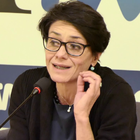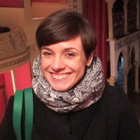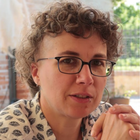The CYBER-VAWG research project consists of three research units: the Bologna Unit, the CNR Unit, and the Salento Unit.

National Coordinator and Bologna Unit Coordinator
Chiara Gius holds a PhD in Sociology of Culture and Communication from the Università di Padova. She is currently a research fellow at the Department of Social and Political Sciences at the Università di Bologna. Her research interests include gender issues, gender-based violence, humanitarian and social communication, as well as the migration experience. She has published extensively on gender-based violence perpetrated through digital technologies, with a focus on the social construction of the issue and its media representation, including within prevention and awareness campaigns. She has collaborated with research centers and academic institutions at both national and international levels.

CNR Unit Coordinator
Angela Toffanin is a researcher at the National Research Council (CNR), Institute for Research on Population and Social Policies (IRPPS), and teaches “Family Models and Transnationality” at the Università di Padova. Her research interests include gender studies, the analysis of international migrations, the sociology of emotions, care, and qualitative research methods. In particular, she focuses on analyzing the processes of reproduction and renegotiation of power relations in everyday life routines. Within this framework, her main areas of analysis include gender inequalities and informal, grassroots citizenship practices, examined through an intersectional approach.
The study of gender-based violence, specifically male violence against women, has been a constant in her professional journey. She has explored both victimization experiences and interventions and policies for prevention and response. During her PhD in Social Sciences (earned at the University of Padua in 2012), she conducted a qualitative study on violence and the conditions for its recognition, based on the narratives of women born and raised in Central and South American countries and residing in Veneto. Later, as a research fellow, she collaborated on the “ViVa – Monitoring, Evaluation, and Analysis of Interventions to Prevent and Combat Violence Against Women” project, led by Maura Misiti.
Currently, she focuses on less visible issues, such as the victimization experiences of disabled individuals and/or migrants, as well as pathways toward economic, employment, and housing autonomy. She has also conducted research on the asylum and refugee reception system, care practices, grassroots citizenship trajectories, and the educational orientation of students born to immigrant parents.

Salento Unit Coordinator
Valentina Cremonesini is Associate Professor of General Sociology at the Università del Salento and she is Scientific Head of the Prin Unit for the Department of Human and Social Sciences at the Università del Salento. After a background in philosophy and the completion of a PhD in sociology, she has been teaching General Sociology, History of Sociological Thought and Contemporary Sociological Theories since 2008. Her research topics concern representations of identity, the social imaginary, power and new forms of social control. These themes are addressed in numerous local, national and international researches in which she has participated since 2000 to the present, combining theoretical attention to the social transformations of European and Western societies with empirical research focused on various themes of contemporaneity, including: the social representation of women and men, the marketing mentality, the city and its biopolitical transformations, the media representation of Southern Italy, the journalistic representation of feminicides, and the formation of the performance subject.
Among her most important publications, Il potere degli oggetti. Il marketing come dispositivo di controllo sociale (Franco Angeli 2006), Città e potere. Per un’analisi foucaultiana dello spazio urbano (Besa 2012), Il salotto invisibile. Chi ha il potere a Lecce? (with M. Longo e S. Cristante, Besa 2014), La parte cattiva dell’Italia. Sud, media e immaginario (with S. Cristante, Mimesis 2016), Non è amore malato (Pensa 2019), Anime fragili e storie criminali. Il racconto giornalistico pugliese sui femminicidi (with I. Colonna e S. Cristante, Il Mulino 2020), L’immaginario della prestazione. Percorsi di ricerca sulle nuove forme di soggettività (H-ermes JC 2021), Michel Foucault: teorie, convergenze, pratiche (with E. Bevilacqua, C. Punzi, M. Vignola, Tangram 2023), Michel Foucault: Sex and sexuality in the genealogy of the modern western subject (Routledge 2024).

Bologna Unit Component
Antonella Mascio is Associate Professor in Sociology of Cultural and Communicative Processes at the University of Bologna, Department of Political and Social Sciences. In recent years her research has focused on online social relations and the relationships between the Internet, television series, celebrities and fashion. She collaborates with Henry Jenkins on the Pop Junctions project (http://henryjenkins.org/). Among her recent publications: Serie di Moda (FrancoAngeli, 2023); “Streaming Audiences: Deconstruction of Fashion Gender Stereotypes Through the Imitation of TV Series Outfits” (in The Routledge Companion to Media Audiences, Routledge, 2024); “Media Convergence, Fashion and TV Series” (in The Routledge Companion to Fashion Studies, Routledge, 2021); “Sponsored Things: Audiences and the Commodification of the Past in Stranger Things” (in Investigating Stranger Things Upside Down in the World of Mainstream Cult Entertainment, Palgrave Macmillan, 2021).
She is currently a member of the PRIN research groups “Social representations of cyber-violence against women and girls: advancing knowledge on an under-conceptualized issue” (coordinator Chiara Gius) and “CELEBR-ETÀ - Aging celebrity in contemporary media and sport contexts: a model of social and cultural well-being” (coordinator Roy Menarini).

Bologna Unit Component
Saveria Capecchi is an associate professor at the Department of Political and Social Sciences, University of Bologna. She teaches Sociology of Culture, Sociology of Media and Communication, and Communication and Gender. She has written books and essays and conducted research, using mainly qualitative methods, on: theories of media effects, social uses of media, Media and Gender Studies, political communication, Media Education, preadolescent imaginary. Regarding the theme of “gender and media,” which characterizes her as a sociologist, specifically she has dealt with gender representation in advertising (recently she has analyzed the phenomenon of online “femvertising” campaigns that extol female empowerment by capturing its contradictions) in fiction (in particular, she has analyzed female and male figures in soap operas), in information (for example, she has analyzed the representation of “expert” figures, such as female politicians in the Renzi government and female scientists who emerged on the public scene during the pandemic, in the press and on TV talk shows on the main Italian networks). In addition, she has recently been working on the representation of male violence against women-including the phenomenon of feminicide-in Italian anti-violence social campaigns and in the media, identifying the main frames (or “frames of meaning” in the Goffmanian sense) used. Her monographs include: “Identità di genere e media”, Carocci (2006); “L’audience attiva. Effetti e usi sociali dei media”, Carocci (nuova ed. 2015); "La comunicazione di genere. Prospettive teoriche e buone pratiche", Carocci (2018); (con Maria Grazia Ferrari) “L’inventrice di robot e lo youtuber”, Franco Angeli (2023).

Bologna Unit Component
Claudia Capelli is a researcher at the Department of Political and Social Sciences at the Università di Bologna, where she teaches the Journalism and Digital Media course for the Master of Science in Journalism, Public and Business Communication. A graduate in Communication Sciences from the Università di Bologna, she later received her PhD in Sociology from the University of Milan.
Her research activity focuses in particular on social representations, the intersection between information and digital media, and in particular on the emergence of new forms of journalism within platforms. Recently, she has also dealt with gender violence and the role played by platforms in the process of constructing the debate on contemporary feminisms.
She has participated in numerous international and national research projects, including, currently, the Horizon Europe PAIR project (2024-2029). Other relevant collaborations include a project on the media representation of the vaccination campaign related to the COVID-19 pandemic, coordinated by Université Jean Moulin Lyon 3 (2021-2022), and the PRIN 2015 project “Social representations of violence against women: the case of feminicide in Italy,” following which she maintained collaboration with the Università di Bologna's Femicide Research Observatory. She also participated in the project “StInGSStop ‘aidiesse’: youth information for youth health,” sponsored by the Ministry of Health.

Bologna Unit - Postdoctoral Research Fellow
Rosa Sorrentino is a Research Fellow at the Department of Political and Social Sciences, University of Bologna, where she collaborates on the PRIN 2022 project “Social Representations of Cyber-Violence Against Women and Girls: Advancing Knowledge on an Under-Conceptualized Issue.” She holds a Ph.D. in Social Sciences and Statistics from the Department of Social Sciences at the University of Naples Federico II, with a dissertation focused on anti-violence centers in the Campania Region. She has contributed to several nationally relevant projects aimed at supporting vulnerable populations. Her research interests include women’s and gender studies, male violence against women, media studies, territorial social policy analysis, and the study of the Third Sector.

CNR Unit - Postdoctoral Research Fellow
Tatiana Motterle holds a degree in Human Rights and Peace Institutions and Policies and a PhD in Social Sciences from the Università di Padova. She worked as a research assistant for the international project Citizens in Diversity: A Four Nation Study on Homophobia and Fundamental Rights, investigating the different dimensions of les-bi-homophobia in Italy. She then participated as a postdoctoral researcher, from 2014 to 2019, in the project INTIMATE - Citizenship, Care and Choice: The Micropolitics of Intimacy in Southern Europe (ERC Grant Agreement) at CES - Centro de Estudos Sociais in Coimbra (Portugal). For INTIMATE, she was involved in the research team on Italy on lesbian sex-affective relationships, experiences of gay fathers who resorted to gestation for others, networks of care and support among trans people. She later collaborated with associations, institutes and universities in Spain, Italy and Portugal on gender-based violence, masculinity, sexual violence in university settings, and occupational well-being.
Placing herself in the areas of feminist, gender and queer studies, she is interested in transfeminism, intersectionality, gender-based violence, education, strategies and networks of care - particularly among LGBTQIA+ older people. She is currently an adjunct professor of Sociology of Education at the University of Padua (FISPPA) and an IRPPS-CNR research fellow in the context of this project (Padua research unit), for which she was mainly involved in the analysis of representations of gender-based cyberviolence in European, Italian, Spanish and French public policies and prevention campaigns, and in interviews with professionals and experts in the field of prevention of and intervention against gender-based violence.

Salento Unit - Research Fellow
Gabriele Forte is a Research Fellow in General Sociology at the Department of Human and Social Sciences, Università del Salento. His main fields of research are: media & communication studies; internet studies; gender, media & communication. Recent publications include: Forte, G. (2024). Corpi sonori queer: Soggettività e comunità transfemministe nello spazio performativo safe del dj set. Connessioni Remote. Artivismo_Teatro_Tecnologia, (8) https://doi.org/10.54103/connessioni/26589; Calefato, P., Forte, G., 2024, Fashion Performances in a drag scene, Russian Fashion Theory: The Journal of Dress, Body & Culture, 74, pp. 343-364; Attimonelli, C., Forte, G., 2024, “L’Internazionale Drill. Media, suoni, immaginari di una scena dai tratti sfuggenti: Rondo, Baby Gang”, Tedua e Massimo Pericolo, in Benasso, S., Benvenga, L., "Trap! Suoni, segni e soggettività nella scena italiana, Novalogos, pp. 92-117; Forte, G., 2023, “L'intrattenimento tecnomagico su Twitch Italia. Lavoro, community e pubblici produttivi”, in Im@go. A journal of Social Imaginary, 23, XII, Mimesis Edizioni, ISSN 2281-8138, pp. 121-145. For the research team at the Università del Salento, he deals with quali-quantitative analysis of the representation of cyberviolence in the Italian press.

Salento Unit Component
Simona De Carlo lives in Lecce where she studies sociology in Università del Salento. For 10 years, she lived in Milan, where she managed all phases of personnel selection (recruiting, CV selection, focus groups, individual interviews), training (on-the-job, continuous or professionalizing) and subsequent professional start-up in Trenkwalder (Employment Agency - Multinational). Since 2015 she has been collaborating with Pannonica Agenzia Musicale, where she coordinates the creation of multimedia content (Video making, Live Presa Live and Social media manager), logistics and production (Artist management, logistics and external and internal moves, timing management, Food & Beverage) of Music Festivals: Time in Jazz, Locomotive Jazz, A Nome Loro.
In 2017, she helped create the transfeminist publishing house Collettiva Edizioni Indipendenti, for which she has been responsible for: editing manuscripts, creating shows, video/reading and spreading reading in the “Borgo San Nicola” prison in Lecce.
Always active in social work, she participates in informal groups of associations (Officine Mai+, Queer Market Show) sensitive to gender and transfeminist issues with which they will inaugurate the first Anti-Discrimination Center in Lecce

Bologna Unit - Research Fellow
Marta Massera holds a degree in Political and Legal Philosophy from Université Jean Moulin Lyon3. Currently, she is a graduate student in Public and Social Communication at the University of Bologna. Her research interests include feminist and gender theories, the performativity of language, sociotechnical approaches, and the design of technological platforms in their intersection with gender issues. Within this research she deals with project communication management.